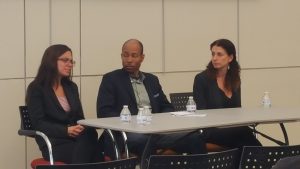The sixth Community Conversation took place on October 28 at the Mount Kisco Public Library.
Would you like to comment on this event? Please send your thoughts to connections@wlsmail.org; provide your first name and your town of residence for attribution.
Quote: “These [men] are worthy of the time it takes to invest in them as individuals and to inspire and allow change to happen.” Tamaris Princi
Tamaris Princi, URINYC. Ms. Princi spoke of her experience working with those who have committed crimes related to domestic violence. She is often asked if there is hope with these individuals. Her short answer is an emphatic “Yes”; while noting that these individuals have done some “monstrous things,” she shared her confidence that people are not only capable of change, but also are worthy of the effort. Ms. Princi described the service provider’s opportunity as one of creating an environment that allows them and inspires them to change; ultimately, they change themselves. Her caution is that those offering support must be careful in this work to not again disenfranchise or traumatize. She sees her work as supporting those in reentry by fostering hope in themselves.
Ms. Princi asked those present what they think their development would have been like if they had been born into the circumstances experienced by some of her clients, i.e., repeated physical or sexual abuse, abandonment by parents, tenuous housing, poverty. Would alcohol or illegal drugs be more or less likely? Is it then surprising that, in defining moments, negative choices are made?
Charles Lewis, Project Renewal/Coming Home. Mr. Lewis reviewed the work of Project Renewal (those in reentry with mental health and substance abuse histories) and Coming Home (a multi-week community and skill building effort). [See also October 10.] He described the importance that compassion, kindness and love had for his own reentry journey. Specifically, Mr. Lewis shared the impact that was made by people from a program outside the prison coming into the prison to show concern for him when his family was unable to do so. These same people continued that support when he reentered the community. In describing the experience of those who participate in Coming Home, Mr. Lewis noted that the transformation that takes place is on both sides, i.e., the mentors (generally white) and the mentees (generally minority) gain new understanding.
Dr. Kimberly Collica-Cox, Pace University. Dr. Collica-Cox reviewed her experience offering programs to Westchester County’s state prison. A current program – Parenting, Prisons and Pups – seeks to helping women to process trauma. However, a key issue is that the program often does not allow sufficient time for the inmates to complete the course – they can be transferred and/or released. Her experience has been that she sees there is often not enough time to offer reentry services, especially when offenders are released abruptly from Court.
Q&A. There was discussion about where responsibility lay for to prepare and support people in re-entry. It appears to be in the community, even the lack of funding programs in facilities received. Ms. Princi noted that her re-entry program has no state or federal funding; she said she is still trying to convince people that the individuals who have committed the crime are worth serving – which means that the full picture is to being seen – victim, offender, family, community.
She shared that she wishes that there were opportunities and funding for more work in restorative justice, which would do more to serve the needs of families. Mr. Lewis asked how we can even begin to heal when only “half the story” is being addressed? He noted that clients suffer from post-traumatic stress disorder – as a result of their life experience and the experience of incarceration. Dr. Collic-Cox pointed to the work of groups like the Women in Prison Association to understand more of what could be done. Ms. Marino from Hour Children was in the audience; she shared that the agency is going to be leading the transitional services activity at Taconic Correctional Facility and that they are looking for volunteers.
Q&A. A community member asked about how to address the negative attitudes of employers when it comes to hiring the negative attic. Mr. Lewis noted the importance of working to sensitive agencies to the benefits that can accrue – for the employer and the community. He noted the challenge of completing employment applications that asked about a criminal history prior to an interview. The lack of awareness of programs such as Federal bonding was raised.
